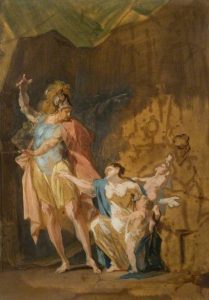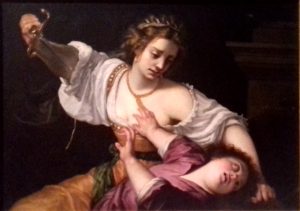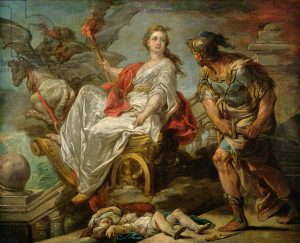35 Medea III and IV in Ovid
Bk VII:294-349 Medea’s destruction of Pelias
Bacchus saw this wondrous miracle from heaven’s heights, and realising from it, that the Nymphs of Mount Nysa, who had nursed him, could have their youth restored, he secured that gift from the witch of Colchis. There was no end to her magic. Phasian Medea, pretending to a sham quarrel with her husband, fled as a suppliant to Pelias’s threshold, he who had usurped Aeson’s throne. There, the king’s daughters received her, since he himself was weighed down by the years. The lying Colchian soon won them over by a skilful show of friendship, and when she told them of one of her greatest gifts, the removal of Aeson’s many years, and lingered over it, hope was aroused in Pelias’s daughters that similar magic arts might rejuvenate their father.

They begged her, and told her to set a price however great. She was silent for a moment, and appeared to hesitate, keeping the minds of her petitioners in suspense by a show of solemn pretence. When, eventually, she promised to do it, she said ‘To give you greater confidence in my gift, your oldest ram, the leader of your flocks, will by turned into a young lamb again, by my magic drugs.’ Straight away the woolly creature, worn out by innumerable years, was dragged forward, his horns curving round his hollow temples. When the witch had cut his wizened throat with her Thessalian knife, hardly staining the blade with blood, she immersed the sheep’s carcass in the bronze cauldron, along with her powerful magic herbs. These shrank its limbs, melted away its horns, and, with its horns, the years. A high-pitched bleating came from inside the vessel, and while they were wondering at the bleating, a lamb leapt out, and frisked away, seeking the udder and milk.
Pelias’s daughters were stunned, and now the truth of her promise had been displayed, they insisted even more eagerly. Three times Phoebus had unyoked his horses, after their plunge into the western ocean, and on the fourth night the stars were glittering in all their radiance, when the deceitful daughter of Aeetes set clear water, and herbs, but ineffectual ones, over a blazing fire. And now the king and his guards also were deep in death-like sleep, achieved by her incantations and the power of her magic spells. The king’s daughters, at her command, crossed the threshold, with the Colchian witch, and stood around his bed. ‘Why do you hesitate, so timidly?’ she said. ‘Un-sheath your blades, and let out the old blood, so that I can fill the empty veins with new! You father’s life and youth are in your hands. If you have any filial affection, if those are not vain hopes that stir you, render your father this service, banish old age with your weapons, and drive out his poisoned blood with a stroke of the iron blade!’
Urged on by these words, the more love each had for him, the quicker she was to act without love, and did evil, to avoid greater evil. Nevertheless they could not bear to see their own blows, and turned their eyes away, and with averted faces, wounded him blindly with cruel hands. Streaming blood, the old man still raised himself on his elbow, and, though mutilated, tried to rise from his bed. Stretching his pallid hands out among the many weapons, he cried ‘Daughters, why are you doing this? What has made you take up weapons against your father’s life?’ Their strength and courage vanished. But as he was about to utter more words, the Colchian witch cut his throat, and plunged his torn body into the seething water.
Bk VII:350-403 Medea flees and reaches Athens
She would not have escaped punishment had she not taken to the air, with her winged dragons. Through the high sky, clockwise,

she fled, over the shadowy slopes of Pelion, Chiron’s home; over Othrys and the places made famous by the ancient fate of Cerambus, who, aided by the nymphs and changed to a winged scarab beetle, lifted into the air, when the all-powerful sea drowned the solid earth, and so escaped un-drowned from Deucalion’s flood. She passed Aeolian Pitane on the left, with its huge stone serpent image, and Ida’s grove where Liber concealed, in the deceptive shape of a stag, the bullock stolen by his son. She passed the place where the father of Corythus, Paris, lay, buried under a little sand; and where Hecuba, changed to a black bitch of Hecate, Maera, spread terror through the fields with her strange barking.
She flew over Astypalaea, the city of Eurypylus, where the women of the island, of Cos, acquired horns when they abused Hercules, as he and his company departed: over Rhodes, beloved of Phoebus: and the Telchines of the city of Ialysos on Rhodes, whose eyes corrupted everything they looked on, so that Jupiter, disgusted with them, sank them under his brother’s ocean waves. She passed the walls of ancient Carthaea, on the island of Ceos, where Alcidamas, as a father, would marvel, one day, that a peace-loving dove could spring from the body of his daughter, Ctesylla.
Then she saw Lake Hyrie, and Cycnean Tempe, made famous suddenly by a swan. There Phylius, at the boy Cycnus’s command, brought him birds and a fierce lion he had tamed. Ordered to overcome a wild bull as well, he did overcome him, but angry that his love was rejected so often, he refused to grant this last gift of a bull, when asked. Cycnus, angered, said ‘You will wish you had’ and leapt from a high cliff. All thought he had fallen, but changed to a swan he beat through the air on white wings, though his mother, Hyrie, not knowing he was safe, pined away with weeping, and became the lake that carries her name.
Near there was the city of Pleuron, where Combe the daughter of Ophius, on flickering wings, escaped death at the hands of her sons, the Aetolian Curetes. And then Medea looked down at the fields of Calaurea’s isle, sacred to Leto, whose king and queen were also changed to birds. On her right was Cyllene, where Menephron lay with his mother, as though he were a wild beast. Further on she sees the Cephisus, the river-god lamenting his grandson’s fate, changed by Apollo into a lumbering seal, and the home of Eumelus, mourning his son Botres, reborn as a bird, the bee-eater, in the air.
At last, the dragon’s wings brought her to Corinth, the ancient Ephyre, and its Pirenian spring. Here, tradition says, that in earliest times, human bodies sprang from fungi, swollen by rain. After Jason’s new bride Glauce had been consumed by the fires of vengeful Colchian witchcraft and both the Isthmus’s gulfs had witnessed flame consuming the king’s palace, Medea impiously bathed her sword in the blood of their sons. Then, after performing this evil act, she fled from Jason’s wrath. Carried by her dragons that are born of the Titans, she reached Pallas’s citadel of Athens. This once knew you Phene, the most righteous, and you old Periphas, both flying in the air, as birds, the eagle and the osprey: and Alcyone, granddaughter of Polypemon, resting on strange new wings. It was Aegeus who gave Medea sanctuary there, damned thereafter by that one action: and not content with taking her in, he even entered into a contract of marriage with her.
Bk VII:404-424 Medea attempts Theseus’s life, then vanishes
Now Theseus came to Athens, Aegeus’s son, but as yet unknown to him. He, by his courage, had brought peace to the Isthmus between the two gulfs. Medea, seeking his destruction, prepared a mixture of poisonous aconite, she had brought with her from the coast of Scythia. This poison is said to have dripped from the teeth of Cerberus, the Echidnean dog. There is a dark cavern with a gaping mouth, and a path into the depths, up which Hercules, hero of Tiryns, dragged the dog, tied with steel chains, resisting and twisting its eyes away from the daylight and the shining rays. Cerberus, provoked to a rabid frenzy, filled all the air with his simultaneous three-headed howling, and spattered the green fields with white flecks of foam. These are supposed to have

congealed and found food to multiply, gaining harmful strength from the rich soil. Because they are long-lived, springing from the hard rock, the country people call these shoots, of wolf-bane, ‘soil-less’ aconites. Through his wife’s cunning Aegeus, the father, himself offered the poison to his son, as if he were a stranger. Theseus, unwittingly, had taken the cup he was given in his right hand, when his father recognised the emblems of his own house, on the ivory hilt of his son’s sword, and knocked the evil drink away from his mouth. But she escaped death, in a dark mist, raised by her incantations.
Bk VII:425-452 The praise for Theseus
Though the father was overjoyed that his son was unharmed, he was still horrified that so great a crime could have come so close to success. He lit fires on the altars, and heaped gifts for the gods. His axes struck the mountainous necks of oxen, their horns tied with the sacrificial ribbons. They say that was the happiest day that dawned in the city of Erectheus. The statesmen celebrated among the people, and they sang verses, made even more inspired by the wine.
‘Great Theseus, admired in Marathon,
for the blood of the Cretan bull,
your act and gift made Cromyon’s fields
safe for the farmers plough.
Epidaurus’s land saw you defeat
Vulcan’s club-wielding son,
and the banks of the River Cephisus
saw evil Procrustes brought down.
Eleusis, sacred to Ceres the Mother,
witnessed Cercyon’s fall:
Sinis, you killed, a man of great strength
twisted to evil art,
who could bend pine-tree trunks to the earth,
and tear men’s bodies apart:
and Sciron is done for, and safe paths reach
Megara’s Lelegeïan wall:
though the ocean denied his bones a grave,
and the land denied the same,
till, long-time hurled, they hardened to cliffs,
and the cliffs bear Sciron’s name.
If we wanted to count your years and your honours,
the deeds would exceed the years:
to you, the bravest, we empty our wine-cups,
and offer our public prayers.’
The palace echoed to the people’s applause and the prayers of friends, and there was no sad place in the whole city.
Source: Ovid’s Metamorphoses, translated by Anthony S. Kline (https://ovid.lib.virginia.edu/trans/Metamorph.htm)